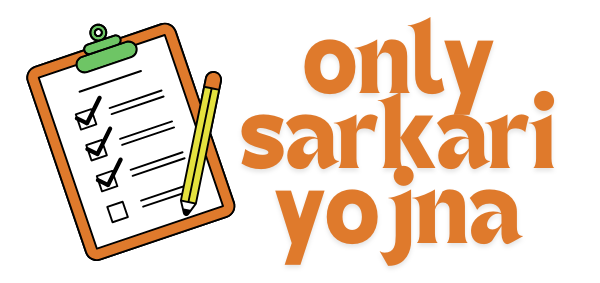Coding has emerged as an essential skill in today’s digital landscape, and introducing this discipline to children can unlock a multitude of benefits.
Beyond merely acquiring a programming language, coding enhances problem-solving abilities, stimulates creativity, and equips children for future careers in an increasingly dynamic job market.
This article examines the significance of coding for children, provides guidance on initiating their learning with age-appropriate resources, and offers strategies for addressing any challenges that may arise during this educational journey.
Engage with this exploration to uncover the rewarding journey of coding for young learners.
What is Coding and Why is it Important?
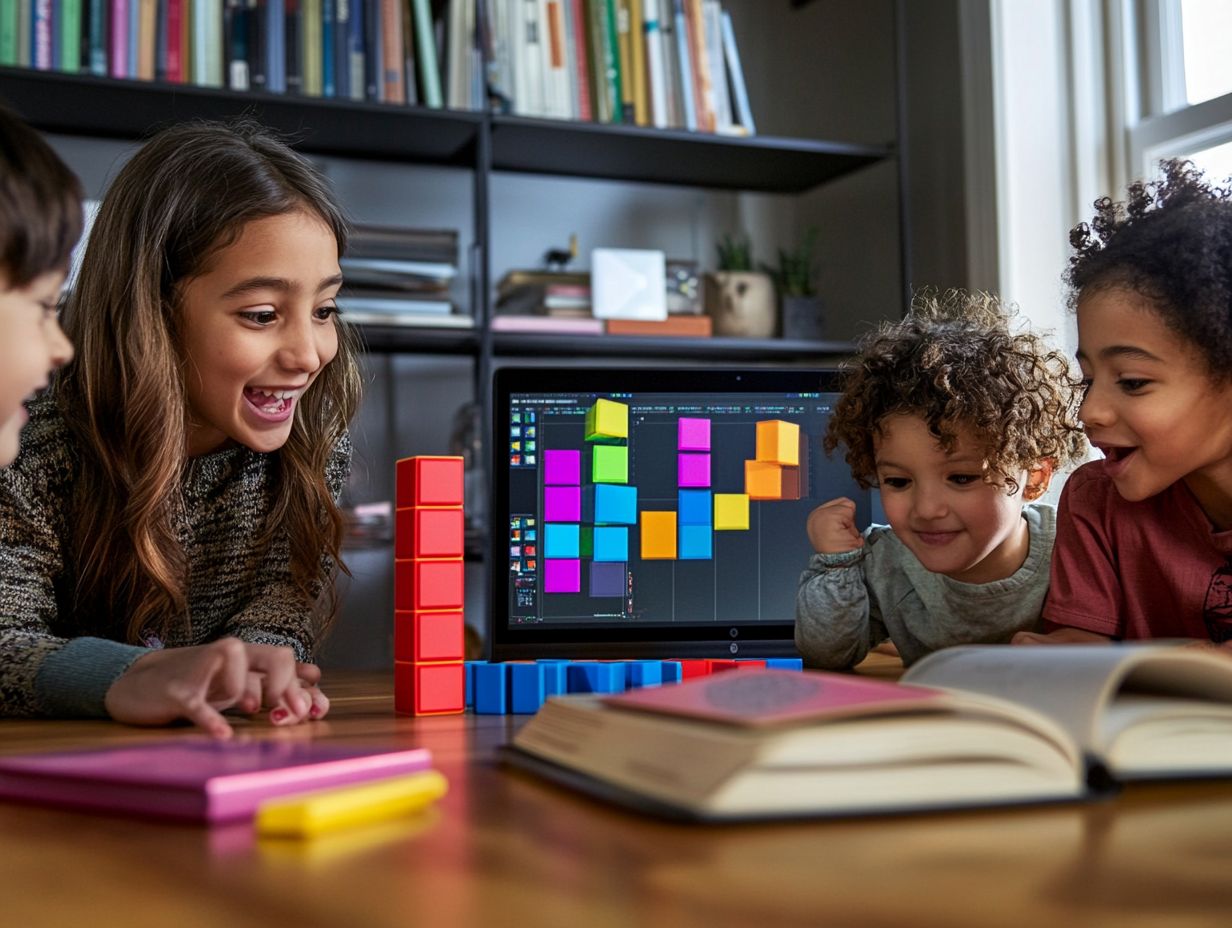
Coding, commonly referred to as programming, is the process of formulating instructions for computers to execute specific tasks. Its significance in today’s digital landscape is paramount.
With the rapid advancement of technology, coding skills have become essential not only within the technology sector but across various industries. By acquiring coding knowledge, individuals enhance their problem-solving abilities and logical reasoning, thereby equipping themselves with the necessary tools to address complex challenges effectively.
Furthermore, coding promotes computational thinking, critical thinking, and digital literacy, ensuring that learners are well-prepared for a future where technological skills are increasingly in demand. Consequently, early exposure to coding can have a profound impact on child development and future career opportunities.
Benefits of Learning Coding for Kids
Learning coding provides numerous advantages for children, significantly enhancing their cognitive skills and preparing them for a technology-driven future.
As children participate in coding activities, they cultivate creativity and innovation, allowing them to express their ideas through digital mediums. This foundational skill not only enriches their STEM education but also fosters critical thinking and problem-solving abilities, which are essential for success in any career path.
Moreover, coding promotes collaboration, as children frequently engage with one another in coding clubs, camps, and competitions, thereby developing strong teamwork and communication skills that will benefit them in their future professional endeavors.
Developing Problem-Solving Skills
Learning to code significantly enhances children’s problem-solving skills by encouraging critical and logical thinking through various coding activities and challenges.
When confronted with coding problems, children learn to decompose complex tasks into manageable components, fostering the development of analytical skills and logical structuring.
This hands-on approach, often exemplified in project-based learning, allows children to experience persistence and adaptability as they troubleshoot their code and devise innovative solutions.
As they engage with coding challenges, learners cultivate a mindset oriented towards exploration and risk-taking—essential elements of effective problem-solving.
With each project, young learners not only acquire technical knowledge but also develop resilience as they encounter and navigate obstacles.
Coding equips children with the capacity to apply logical reasoning, transforming abstract concepts into concrete applications. This ability to deconstruct problems and evaluate potential outcomes sharpens their cognitive skills, enabling them to approach a wide range of challenges in life more effectively.
Furthermore, collaborative coding activities promote teamwork and communication, underscoring the significance of diverse perspectives in generating solutions.
Ultimately, these experiences establish a robust foundation for confident decision-making and creative problem-solving in their future pursuits.
Enhancing Creativity and Innovation
Coding fosters creativity and innovation in children by equipping them with the necessary tools to develop their own digital projects, ranging from games to applications. By engaging with various coding languages such as Scratch, Python, and JavaScript, children can articulate their ideas and actualize them through creative coding initiatives.
This experience not only enhances their technical proficiency but also cultivates a sense of ownership and self-confidence in their capabilities. The integration of gamification and educational games further stimulates their creativity, enabling children to think critically and devise innovative solutions within their coding projects.
Through interactive platforms and hands-on projects, young coders have the opportunity to design captivating games that ignite their imagination, utilizing the visual components of Scratch or the versatility of Python to create interactive narratives.
As they explore web development with JavaScript, they experience the thrill of building their own websites, experimenting with vibrant aesthetics while developing their problem-solving abilities.
Each line of code presents an opportunity for creative expression, allowing them to blend art and technology in distinctive ways. The satisfaction of witnessing their concepts evolve into functional projects not only enhances their comprehension of digital creation but also fosters a mentality of continuous learning and exploration in an ever-evolving digital landscape.
Preparing for Future Careers
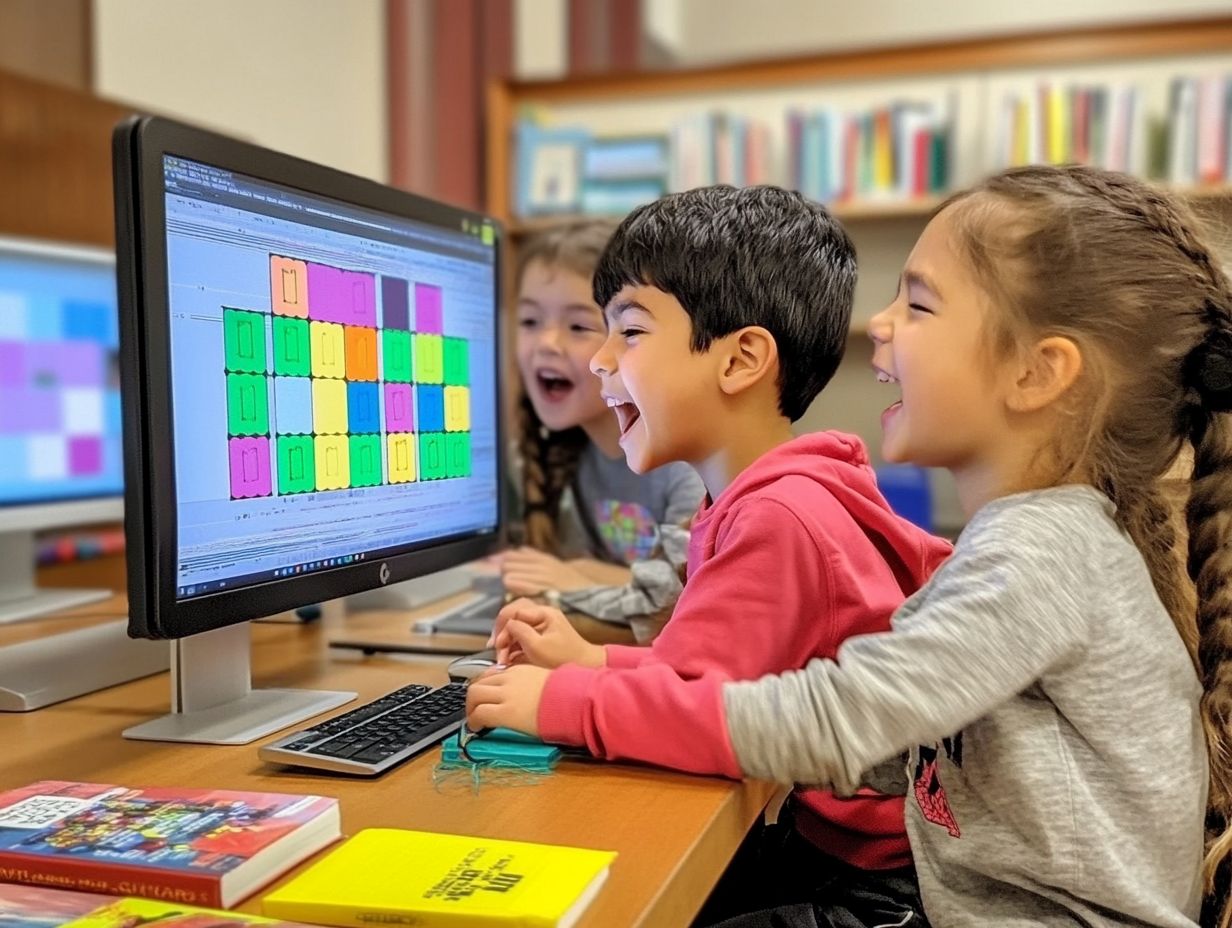
Acquiring coding skills is becoming increasingly essential in preparing children for future careers, as the demand for tech-savvy individuals continues to rise across various industries. By developing coding proficiency at a young age, children position themselves favorably for future job opportunities that require digital literacy and technical skills.
Additionally, learning to code instills a sense of digital citizenship in children, making them responsible and informed users of technology. As they participate in coding communities, clubs, and online courses, they gain valuable insights into the tech industry and enhance their career readiness through hands-on learning experiences and mentorship opportunities.
The significance of coding extends beyond traditional computer science roles, permeating fields such as healthcare, finance, and even creative industries. As organizations increasingly rely on data analysis and efficient digital solutions, proficiency in programming languages can distinguish candidates in a competitive job market.
As innovation drives the demand for new technologies, youth equipped with coding skills become invaluable assets, capable of adapting to and thriving in various professional environments. Building a foundation in these essential skills not only enhances employability but also fosters critical thinking and problem-solving abilities—key attributes in today’s workforce.
How to Get Kids Started with Coding
Introducing children to coding represents an exciting opportunity that unlocks a myriad of possibilities, commencing with the careful selection of age-appropriate resources and tools that captivate their curiosity.
Parents and educators have access to a diverse array of options, including online coding courses, coding camps, and interactive learning platforms that present coding concepts in an engaging and enjoyable manner.
By utilizing hands-on learning experiences, children can delve into the fundamentals of coding through creative activities and projects that enhance their problem-solving and logical thinking abilities.
This initial exposure is essential for establishing a strong foundation for their coding journey.
Age-Appropriate Resources and Tools
Selecting age-appropriate coding resources and tools is crucial for ensuring that children engage in effective and enjoyable learning experiences.
By introducing coding languages such as Python and JavaScript through interactive platforms, educators can facilitate meaningful learning experiences that resonate with young learners.
Resources such as Code.org and Tynker offer gamified lessons that sustain enthusiasm while imparting fundamental programming skills.
It is essential for these tools to align with the cognitive development levels of learners, fostering an environment in which they can comprehend complex concepts without becoming overwhelmed.
Engaging young minds in such activities not only cultivates critical thinking and problem-solving abilities but also prepares them for a future that is increasingly integrated with technology.
Fun and Engaging Activities for Learning
Incorporating enjoyable and engaging activities is essential for making the learning process enjoyable for children as they embark on their coding journey. Activities such as coding games and interactive projects not only capture their attention but also enhance their comprehension of coding concepts.
Participation in coding clubs and camps provides children with opportunities for hands-on learning and collaboration with peers, thereby improving their coding skills through shared experiences. Integrating gamification elements into lessons makes the learning process dynamic and motivating, encouraging young learners to explore the world of coding with enthusiasm.
To further enhance their educational experience, environments that foster collaborative learning can be established, allowing children to work together on coding challenges and projects. This teamwork promotes the development of social skills while also encouraging problem-solving and critical thinking.
By utilizing platforms that incorporate gamification, such as coding challenges designed as quests or games, young learners can engage more deeply with the material while enjoying friendly competition. Projects like creating their own simple games or animations reinforce coding concepts in a rewarding and imaginative manner.
These varied approaches provide a comprehensive learning experience, fostering both creativity and technical skills.
Overcoming Challenges in Teaching Kids to Code
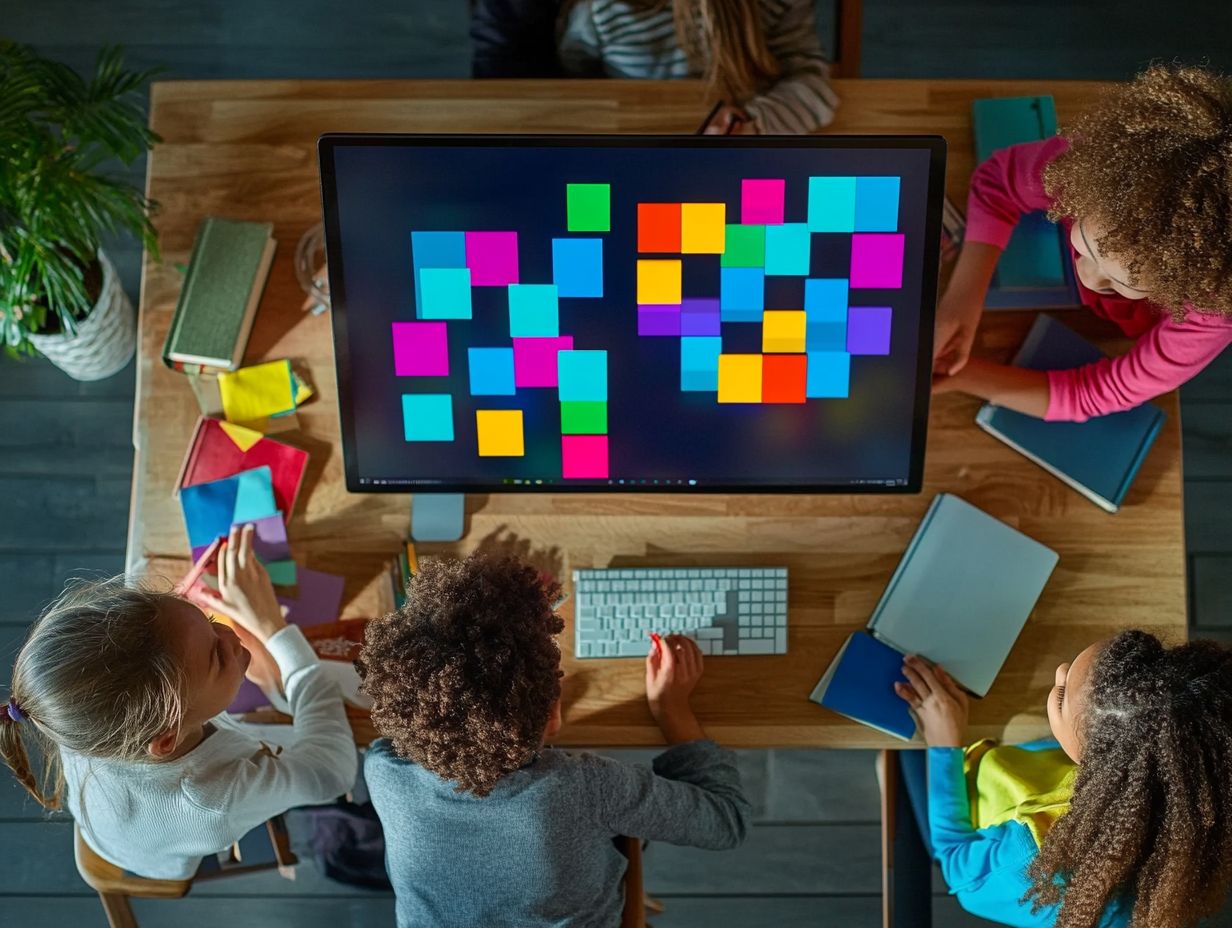
Teaching children to code involves distinct challenges; however, recognizing and addressing these obstacles can result in a highly rewarding educational experience.
Common difficulties, such as frustration with coding concepts or challenges in comprehending specific programming languages, can be alleviated through effective mentorship and support. It is crucial to encourage perseverance, as children frequently encounter obstacles in their coding journeys.
A nurturing environment plays a vital role in helping them navigate these challenges. By promoting a growth mindset, parents and educators can enable children to perceive mistakes as valuable opportunities for learning and exploration in their coding pursuits.
Common Struggles and How to Address Them
Common challenges that children encounter while learning to code often arise from confusion regarding coding concepts and a fear of failure, which can impede their coding proficiency.
One of the primary obstacles is the initial difficulty in understanding abstract programming concepts, which may result in frustration and self-doubt. To address this issue, it is beneficial to introduce engaging coding tutorials that incorporate gamified elements, thereby making the learning process more relatable and enjoyable.
Moreover, reinforcing logical reasoning skills is essential; encouraging children to approach problems systematically can enhance their confidence when tackling coding challenges.
Additionally, pairing students for collaborative coding sessions can create an environment in which they feel comfortable discussing their difficulties and sharing solutions. This collective approach to coding fluency can significantly alleviate anxiety and promote a more effective learning experience.
Frequently Asked Questions
What are the benefits of coding for kids?
Coding can improve problem-solving skills, enhance creativity, and develop logic and critical thinking abilities in kids.
How does coding help kids in their academic performance?
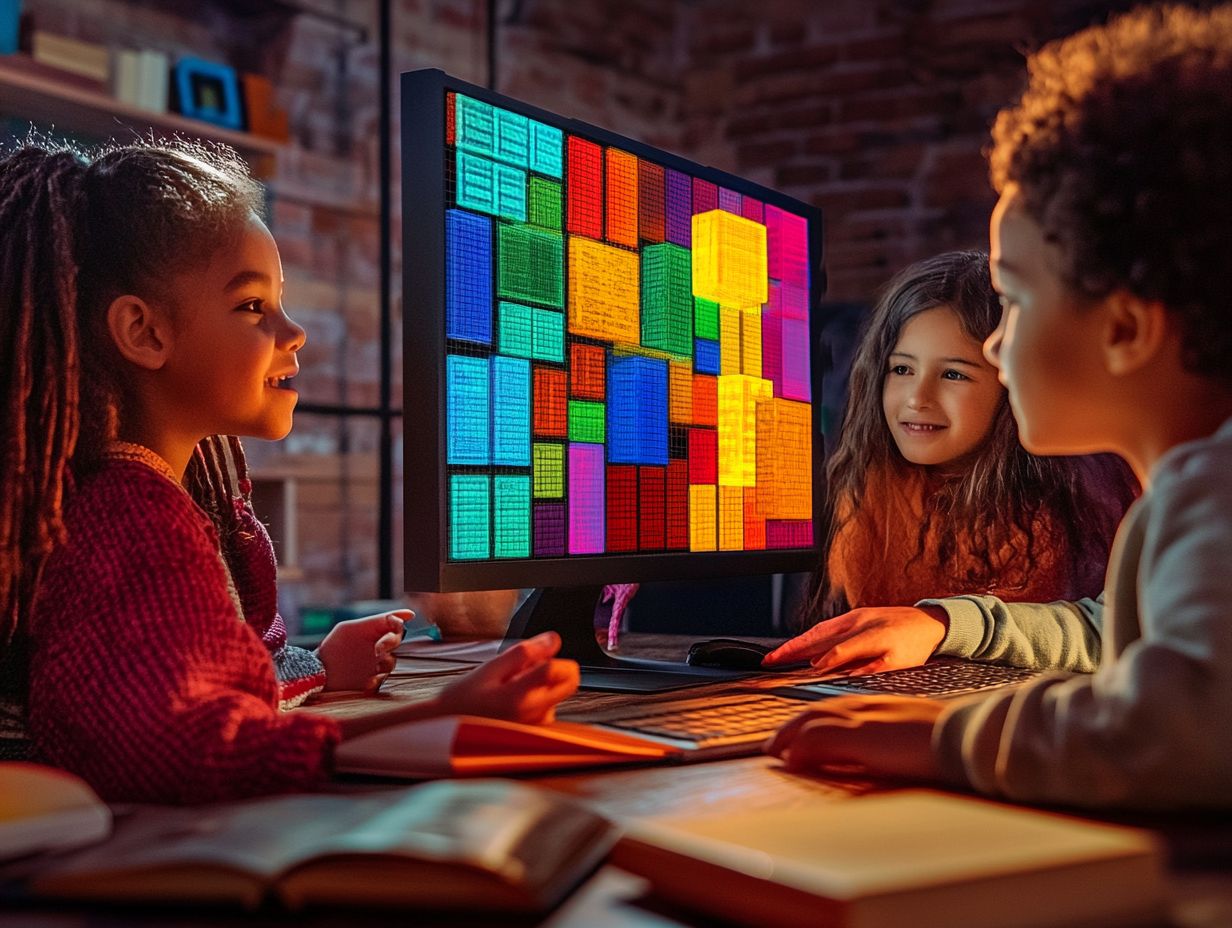
Coding can improve kids’ math and reading skills, as well as their overall academic performance, by teaching them to break down complex tasks and think logically.
What are some long-term benefits of coding for kids?
Learning coding at a young age can help kids develop skills that are in high demand in the job market, such as computer proficiency and problem-solving abilities.
What is the best age for kids to start learning coding?
Children as young as five can start learning coding with age-appropriate tools and activities, but it’s never too late to begin. Kids of all ages can benefit from coding education.
Are there any social benefits of coding for kids?
Coding can foster collaboration and teamwork, as well as boost confidence and independence in kids as they work on projects and solve problems on their own.
How can coding help kids become better communicators?
Coding requires clear and precise communication of ideas and instructions, which can help kids become better communicators in both verbal and written forms.
